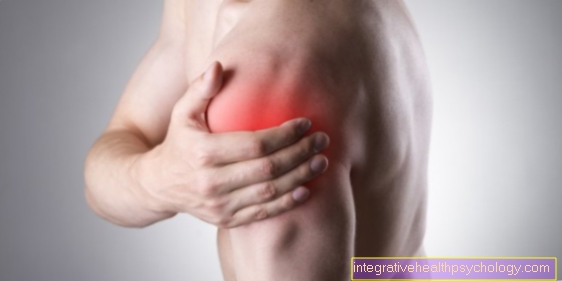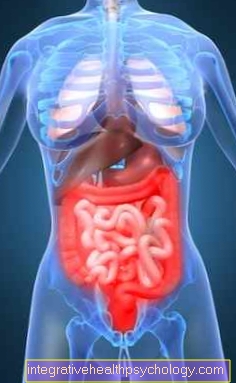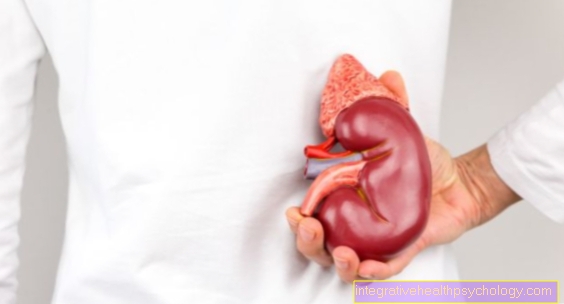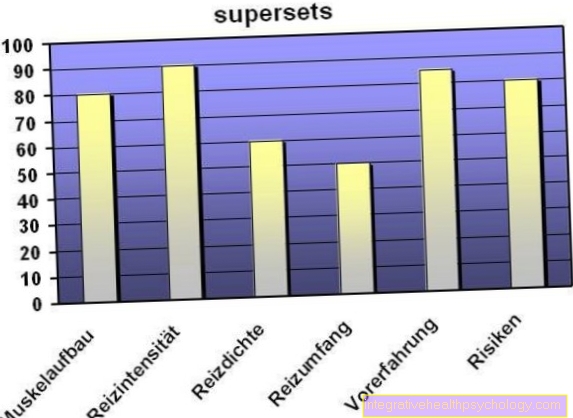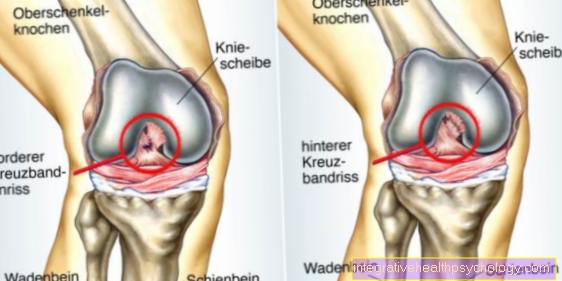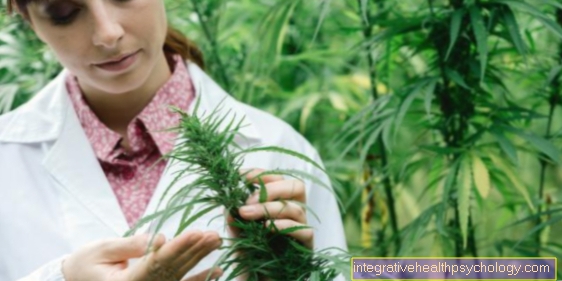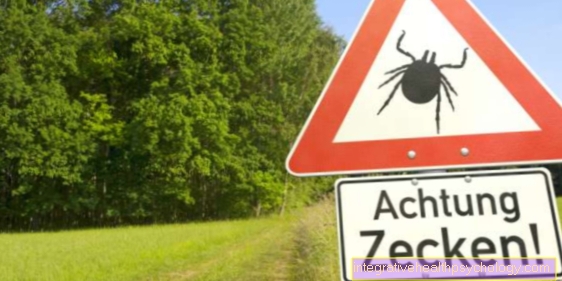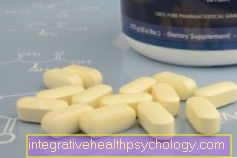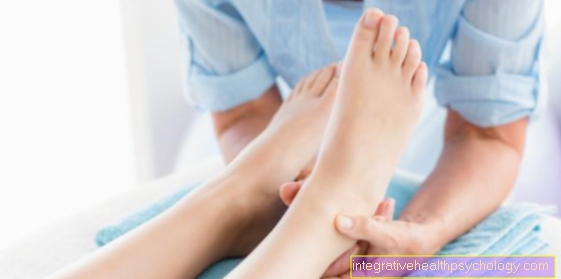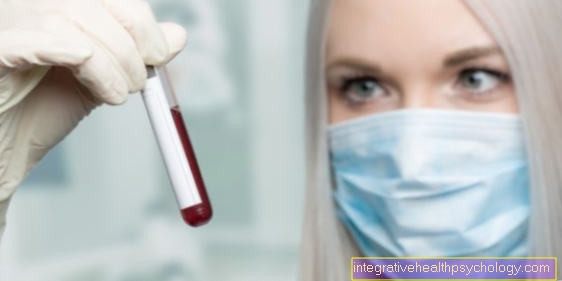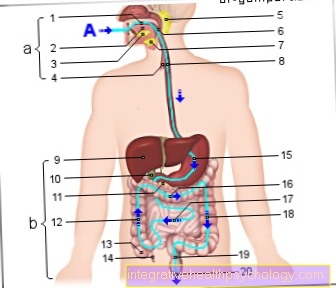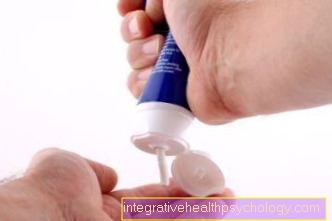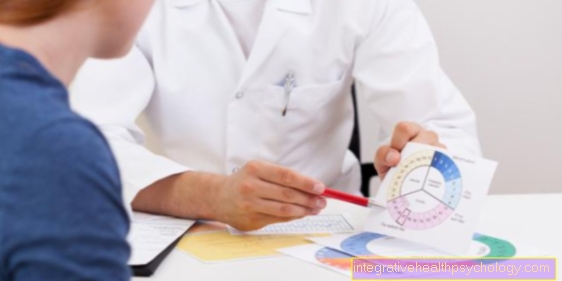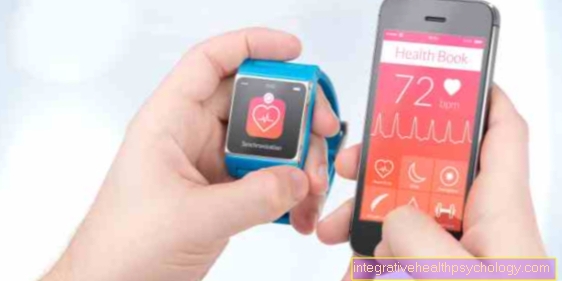Yellow fever vaccination
definition
The yellow fever vaccination is a live vaccine that is used to protect against yellow fever, which is particularly endemic in South America and Africa.
The vaccination cannot - like other vaccinations - be carried out by every family doctor, because there are special yellow fever vaccination centers that are authorized to carry out the vaccination.
After the one-time yellow fever vaccination, there is lifelong protection. Up until 2016, a booster vaccination was mandatory in many countries if it was more than 10 years ago.
Read more on the subject under: Yellow fever

Who should vaccinate?
The yellow fever vaccination is not one of the standard vaccinations recommended by the Standing Vaccination Commission (STIKO) but one of the travel vaccinations.
People who travel to yellow fever infection areas or who travel to countries where yellow fever vaccination is a requirement for entry should be vaccinated.
Yellow fever occurs in parts of Africa (Angola, Ethiopia, Equatorial Guinea, Bensin, Burundi, Cameroon, Republic of the Congo, Ivory Coast, Central African Republic, Chad, Gabon, Gambia, Ghana, Guinea, Guinea-Bissau, Kenya, Liberia, Mail, Mauritania, Niger, Nigeria, Rwanda, Senegal, Sierra Leone, Sudan, South Sudan, Togo, Uganda, Eritrea, Somalia, Tanzania, Zambia, São Tomé and Príncipe) and South America (Argentina, Bolivia, Brazil, Ecuador, Colombia, French Guiana, Guyana, Panama , Paraguay, Peru, Suriname, Venezuela, Trinidad and Tobago).
How do I find a yellow fever vaccination center?
On the website of the Center for Travel Medicine (CMI) there is a directory with all yellow fever vaccination centers in Germany, sorted by postcode.
If there is no access to the Internet, the treating family doctor can also be asked.
They can look for yellow fever vaccination centers in the vicinity.
How does a yellow fever vaccination work?
The yellow fever vaccination is carried out in the same way as other vaccinations.
First, the vaccinating doctor will check whether there are any contraindications for the vaccination.
These include, for example, acute febrile infections, diseases with a significantly weakened immune system such as advanced HIV disease, pregnancy and a chicken protein allergy. Even in patients over 60 years of age, vaccination should only be given due to the increased risk of complications more accurate Weighing risks and benefits respectively.
If there are no contraindications, the area to be vaccinated (usually the upper arm) is disinfected and the vaccination is administered under the skin (subcutaneously).
The vaccination will then be noted in the vaccination card.
Side effects to be expected
The possible side effects of a yellow fever vaccination include infections in the area of the injection site with redness, swelling and tenderness.
A few days after the vaccination, a flu-like infection with fever, fatigue as well as headache and body aches as well as nausea, vomiting and diarrhea can occur. Symptoms can last for 5-10 days.
Very rarely there is a strong allergic reaction in the form of anaphylaxis (allergic shock).
This showed up minutes to hours after the vaccination through symptoms such as skin rash with reddening, nettle formation (urticaria), development of breathing difficulties with swelling of the mucous membrane in the nasopharynx, racing heart (tachycardia) and nausea.
If an anaphylactic reaction occurs, this must be treated by administering certain medications (glucocorticoids, antihistamines, adrenaline).
Very rarely, after a yellow fever vaccination, inflammation of the brain (encephalitis) or meninges (meningitis) can occur; this is referred to as a yellow fever vaccine-associated neurological disease. So far it has occurred almost exclusively in newborns. Therefore there is a contraindication to the yellow fever vaccination in infants under 9 months of age.
A disease that appears clinically like yellow fever and affects various organs and in many cases is fatal can occur in rare cases. One speaks then of a yellow fever vaccine-associated viscerotropic disease.
The frequency is around 1: 1 million.
How long should I not drink alcohol afterwards?
Alcohol is not completely banned after vaccinations.
However, it is advisable to avoid alcohol as much as possible, at least for the first few weeks, if possible.
Should alcohol be consumed, then not in large quantities. After vaccination, the immune system is more susceptible to illness.
With a live vaccination in particular, it is as if the immune system were going through a mini-infection.
For this reason, alcohol consumption after a vaccination is similar to alcohol consumption during an infection or a flu-like infection: It should be avoided as far as possible or, at most, consumed to a limited extent.
How long can I not do sports afterwards?
Exercising after the yellow fever vaccination is similar to alcohol.
It should be borne in mind that vaccination will bring the immune system into contact with new substances introduced by vaccination against which it is supposed to develop immunity.
During this time it is more susceptible than usual. Therefore, as with an acute infection, exercise should be avoided at least during the first few days after a vaccination.
Light sports activities can be resumed a few days after the vaccination.
High-performance sport should be practiced again after a week at the earliest.
What are the costs for the vaccination?
The costs for a yellow fever vaccination vary from vaccination center to vaccination center.
The costs for a travel medical consultation and the subsequent yellow fever vaccination are on average around 60-80 euros.
The prices can usually be requested beforehand by telephone from the respective vaccination center.
Who pays for the vaccination?
In recent years, more and more health insurances are increasingly paying the travel vaccinations requested by private individuals.
The yellow fever vaccination is currently still only covered by certain health insurance companies, as it is a private service.
Some health insurances do not pay the entire vaccination but grant a lump-sum annual subsidy for travel vaccinations recommended by the Standing Vaccination Commission (STIKO).
The AOK supports its insured persons, for example, with a lump sum of 50 euros per year for travel vaccinations.
The Barmer grants an annual grant of 100 euros.
Techniker Krankenkasse (TK) pays the costs for travel vaccinations recommended by STIKO, including yellow fever vaccination, with a few exceptions.
When do I have to have my yellow fever vaccination refreshed?
In 2014 the WHO (World Health Organization) stipulated that lifelong protection can be assumed after a single yellow fever infection.
Up until then, a booster vaccination every 10 years was recommended.
Until 2016, the respective countries were still allowed to require a yellow fever vaccination upon entry that was not older than 10 years.
Since 2017, a single yellow fever vaccination should be sufficient in all countries.
Is that a live vaccine?
Yes, the yellow fever vaccination is a so-called live vaccine with attenuated pathogens.
Attenuated means that the pathogenic property of the pathogen has been specifically and significantly reduced in the laboratory.
Read more on the subject under: Live vaccination
From how many years can I vaccinate yellow fever?
Yellow fever vaccination is contraindicated in infants under 9 months of age.
All people over 9 months old can be vaccinated if there are no other contraindications.
The indication should be carefully examined in patients over 60 years of age, as the risk of complications after vaccination increases at this age.
How soon will I be vaccinated?
Immunity, i.e. vaccination against yellow fever, is available after about 10 days. According to more recent findings, it then lasts for a lifetime without the need for a booster vaccination.

